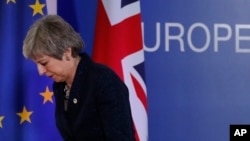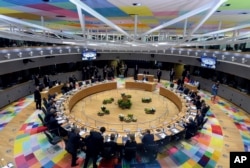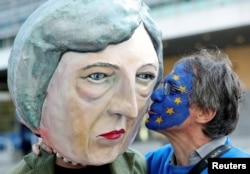In the past two years, British Prime Minister Theresa May has insisted repeatedly that Britain will exit the European Union on schedule on March 29 — she has said so 108 times from the dispatch box in the House of Commons.
But on Thursday, the embattled leader, whose days in office appear to be numbered, was forced to appeal to her fellow EU national leaders for a three-month postponement, throwing into deeper confusion a Brexit process that has pushed Britain into a constitutional crisis, dividing the country.
May's face-to-face request at a summit in Brussels clearly strained the patience of the EU's other 27 national leaders, who are close to a breaking point. They fear Britain's tangled exit will never get resolved. During the summit, the Luxembourg prime minister told reporters: "We are not in a souk and we are not going to bargain for the next five years."
French President Emmanuel Macron was especially reluctant about granting an extension, questioning why Britain should have more time to get its house in order, and skeptical whether it ever would.
"We are heading towards no deal," he said as the leaders gathered.
His foreign minister, Jean-Yves Le Drian, told the French National Assembly on the eve of a two-day EU summit in Brussels this week that France would oppose a lengthy Brexit postponement. He said Paris would only support a short extension, one giving the British parliament sufficient time to approve a contentious withdrawal agreement May and the EU agreed to in November — but one that British lawmakers have overwhelmingly rejected twice.
Without that approval, "the central scenario is a no-deal exit — we are ready for it," the foreign minister said.
Charles Grant, director of the research group Center for European Reform, says Macron worries most about the possible "spoiling" impact Britain may have on European Parliament elections this May, if Britain participates as a result of any lengthy Brexit delay. He "fears the UK will 'pollute' EU politics if the Brits hang around for a prolonged period," Grant tweeted.
After more than two years of haggling with Britain over a transition deal, and amid accusations of British cherry-picking, some of the bloc's national governments weren't that far behind the French in toying with the idea of saying enough is enough, EU officials told VOA.
Short reprieve possible
Led by Germany, prudence overcame exasperation, and French resistance, on Thursday.
No EU country wants to be blamed for Britain crashing out of the bloc without a deal. Such a chaotic departure would undermine EU principles of fraternity and would not only deeply harm Britain economically but also several near European neighbors, including France and Ireland, EU leaders fear.
Initially, the EU 27 planned to agree to a shorter delay than May requested and one conditional on British lawmakers approving the transition deal, which is deeply unpopular with both hardline Brexiters in May's ruling Conservative party and pro-EU lawmakers across the British political spectrum.
But they pulled back, fearing they might push Britain into crashing out without a deal, as much by accident as design. They also concluded, EU sources say, that May would fail a third time to get backing for her deal next week from the British parliament. They wanted to avoid having to hold an emergency Brexit summit next week to consider what to do again, enduring yet more cliff-edge drama.
Instead, after running hours past the time allocated to consider the British request, leaving the world's media kicking their heels waiting for a decision, the EU 27 came up with what has been dubbed a "flextension" in a bid to seize more control of the process.
Britain now has a short reprieve until May 22, if the British parliament ratifies May's deal next week. If it doesn't, then Britain has until April 12 to announce it will take part in European elections and would then be accorded an extension until the end of 2019.
If it has not agreed to participate in the elections, then there can be no long extension. Donald Tusk, the president of the European Council, said the EU decided on the two options in a "positive spirit."
Britain's next move
What Britain does now remains unclear and the drama will shift from Brussels back to London and a deadlocked British House of Commons. There are few signs that parliament will change its mind and approve the negotiated transition deal, one which Brexiters' fear could lock Britain into a semi-permanent customs union with the bloc. Pro-EU lawmakers worry it doesn't tie Britain closely enough to the EU.
Prime Minister May hasn't helped the prospect of the deal being endorsed, say critics, who accuse her of brinkmanship, daring British lawmakers to reject her agreement and court the dangers of a no-deal Brexit.
On Wednesday, she made a short, defiant statement from Downing Street, one that scorned British lawmakers and deflected blame for the crisis on parliament, in an apparent bid to turn voters' anger on to MPs. "You are tired of the infighting; you're tired of the political games and the arcane procedural rows, tired of MPs talking about nothing else but Brexit," she told the British public in the televised address.
The statement angered many lawmakers, who dubbed it toxic and complained it was inflammatory at such a fevered time as this to describe the impasse as a matter of parliament versus the public.
"If you are trying to persuade MPs, you don't help yourself by lambasting them," said Conservative lawmaker Mark Francois, a hardline Brexiter. He says if May brings back her deal to parliament, she "will get the same answer."
Phillip Lee, a pro-EU Conservative, accused May of stoking unrest by casting lawmakers as "enemies of the people." Some lawmakers said they feel in physical danger, after receiving death threats following May's statement.
"It is out of order. Lawmakers do their best for constituents and it is fundamentally wrong to undermine parliament," he warned.
Some EU diplomats warned a no-deal British exit is still a possibility. Some are putting hope in the British parliament seizing control of the Brexit process from May and crafting a softer Brexit, even to revoke Britain's application to leave the EU. That hope has been prompted by more than two million people signing a petition this week for Brexit to be abandoned.







